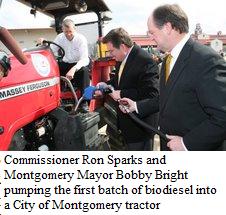 John Deere is now offering “ethanol insurance” through their John Deere Risk Protection division. It’s a policy for the grower who wants some extra coverage in case he can’t fulfill a delivery contract to an ethanol plant.
John Deere is now offering “ethanol insurance” through their John Deere Risk Protection division. It’s a policy for the grower who wants some extra coverage in case he can’t fulfill a delivery contract to an ethanol plant.
Dennis Daggett, Director of Marketing for John Deere Risk Protection, is on the scene here at the National Farm Machinery Show where I’ve been providing some coverage over on our AgWired site with them as the sponsor. Dennis has been involved in crop insurance for over 30 years. He says Deere offers standard policies like multi-peril and crop hail. But this year they’ve introduced a new ethanol policy.
The first thing a farmer needs to do though is have a multi-peril plan in place. Then they can purchase the extra coverage. Sounds like good timing as we hear about farmers continuing to work at meeting the needs for both fuel and food. The policy is available for this season in states in the grain belt area of the midwest only. You can find out all you want on their website.
You can hear Dennis talk about the new product here: [audio:http://www.zimmcomm.biz/farm-machinery/nfms-08-daggett.mp3]


 Last fall, Alabama Agriculture & Industries Commissioner Ron Sparks and Montgomery, Alabama Mayor Bobby Bright announced a partnership that would make used cooking grease into biodiesel to be run in the city’s vehicles. This week, they cut the ribbon on the new Center for Alternative Fuels Biodiesel Production facility.
Last fall, Alabama Agriculture & Industries Commissioner Ron Sparks and Montgomery, Alabama Mayor Bobby Bright announced a partnership that would make used cooking grease into biodiesel to be run in the city’s vehicles. This week, they cut the ribbon on the new Center for Alternative Fuels Biodiesel Production facility. Four cabinet-level officials will be participating in the upcoming
Four cabinet-level officials will be participating in the upcoming  The Southern Waste Information eXchange and the Florida BioFuels Association are sponsoring the 1st Annual
The Southern Waste Information eXchange and the Florida BioFuels Association are sponsoring the 1st Annual  The conference will provide a forum for informing the public and private sectors of the economic and environmental benefits of converting waste materials to alternative fuels such as biodiesel and ethanol as well as energy recovery.
The conference will provide a forum for informing the public and private sectors of the economic and environmental benefits of converting waste materials to alternative fuels such as biodiesel and ethanol as well as energy recovery.  The first E85 station for the state of Mississippi is scheduled to open later this month.
The first E85 station for the state of Mississippi is scheduled to open later this month. Ford’s Fuel off I-20 in Newton is pleased to be offering the fuel at
Ford’s Fuel off I-20 in Newton is pleased to be offering the fuel at  Research into additional oilseeds to make into biodiesel is gaining more popularity, especially as the cost for soybean oil, currently the most commonly used feedstock, soars to record levels.
Research into additional oilseeds to make into biodiesel is gaining more popularity, especially as the cost for soybean oil, currently the most commonly used feedstock, soars to record levels. “We are hearing more and more positive talk when it comes to biodiesels, even more so than corn for ethanol,” Aakre said. “One of the advantages of biodiesel is the potential for individual farmers or a small group of farmers to produce their own fuel in a much simpler technology than ethanol.”
“We are hearing more and more positive talk when it comes to biodiesels, even more so than corn for ethanol,” Aakre said. “One of the advantages of biodiesel is the potential for individual farmers or a small group of farmers to produce their own fuel in a much simpler technology than ethanol.” Rep. Alan Freeman, R-Macon, said House Bill 1174 would help farmers and agribusinesses in Georgia’s small but growing biofuel industry. With co-sponsors that include the Democratic minority leader and the governor’s floor leader, Freeman said he hopes the measure can win passage.
Rep. Alan Freeman, R-Macon, said House Bill 1174 would help farmers and agribusinesses in Georgia’s small but growing biofuel industry. With co-sponsors that include the Democratic minority leader and the governor’s floor leader, Freeman said he hopes the measure can win passage. Jack Purdy, who has farmed in Woodstock for more than 30 years, now also is the owner of P.K. Biodiesel — a plant on his farm that makes fuel from soybean oil.
Jack Purdy, who has farmed in Woodstock for more than 30 years, now also is the owner of P.K. Biodiesel — a plant on his farm that makes fuel from soybean oil. Now I can tell you that algae as an additional feedstock for biodiesel was a hot topic of discussion at the recent National Biodiesel Conference and Expo in Orlando, Florida. In fact, the last general session of the conference included a discussion of the various feedstocks, including talk about how algae could produce a thousand gallons of oil for every acre grown.
Now I can tell you that algae as an additional feedstock for biodiesel was a hot topic of discussion at the recent National Biodiesel Conference and Expo in Orlando, Florida. In fact, the last general session of the conference included a discussion of the various feedstocks, including talk about how algae could produce a thousand gallons of oil for every acre grown.